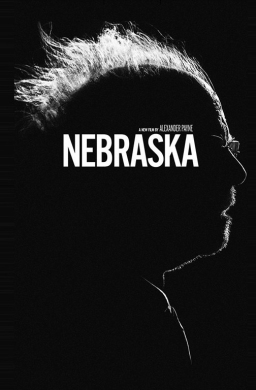By Joe Vitale

Nebraska stars Bruce Dem as Woody and Will Forte as David. Courtesy of IMDB
When anybody asks for Netflix recommendations, I always give the same response: Nebraska. Few people, unfortunately, are intrigued. I suspect it is either the name of the film or perhaps its visual imagery on Netflix. My plot summary (“An old guy thinks he won a million dollars so he makes his son drive him to Nebraska to pick it up”) does not do much to spark the imagination either. But, it remains my go-to recommendation.
Shot in black and white, Nebraska tells the story of an elderly Woody Grant (Bruce Dern) whose alcoholism and tour in the Korean War have dulled him to reality. The movie opens with him wandering on the side of a highway, convinced that he has won a $ 1 million sweepstakes prize. He needs to travel from his hometown of Billings, Montana to Lincoln, Nebraska to collect his prize — one that will lift him out of his uneventful small town life. With the help of his son David (Will Forte), who knows that the prize is a mail scam, and despite the objections of David’s sharply funny mother Kate (Jane Squibb), he decides to take his father to Lincoln. His intentions are somewhat clear: He wants to spend time with his aging father, but he also wants to prove to him that it is a scam, so the pair sets off.
The trip takes them through Rapid City, South Dakota and into Hawthorne, the fictional town where David and Woody see Woody’s old business partner, Ed Pegram (Stacy Keach). Ed congratulates Woody on winning $ 1 million, and the news quickly spreads around Hawthorne. Woody, once the town drunk, turns into the subject of local news and gossip. But even here, unmerited achievement attracts jealousy. Ed wants a cut of Woody’s money, on the count of an old unpaid loan given to Woody. When David tells Ed that his father does not owe him any money, Ed employs two locals to attack Woody and David and steal the sweepstakes ticket. He quickly learns it is a scam, prompting Ed to read it aloud in the local pub at Woody’s expense.
The movie’s dark reality serves as a source of sympathy for Nebraska’s characters. Many, including Woody’s relatives and the people of Hawthorne, seem frustratingly content with their lives.
Directed by Alexander Payne, whose camerawork focuses on mostly medium shots, there is not much to be excited about for these communities. There is an outward appearance of general indifference. The high point of family bonding for Woody’s family is watching a football game and arguing about who owned what car and when. David’s brother Ross (Bob Odenkirk) is a small town local news anchor and is treated like George Clooney. Woody’s mind is constantly wandering (the same way he was wandering in the opening scene of the film) and his default responses are “Doesn’t matter” and “Don’t know.”
But, Nebraska’s bleakness makes some of its shining moments of humor and excitement even more so.
Kate, an aging wife and mother is crass to the extent that her lowbrow contributions are so vulgar and so pointed that they leave everyone on screen stone faced.
Walking along the family graves in Hawthorne, her honesty cuts like a knife. As they pass the resting spot of an old friend, Kate tells David: “He wanted in my pants, too. But he was so boring.” Without notice, she lifts her dress and flashes the tombstone. “See what you could have,” she shouts, “if you hadn’t talked about wheat all the time.” Later, as they pass her cousin’s tombstone, David asks how she died, to which Kate suggests, “Saw herself in the mirror one day.”
Most of the movie, though, focuses on the strains that Woody’s deteriorating mental state places on his two sons. David’s demeanor is mostly passive, but his actions speak loudly. He wants to see his father happy, even if he has a difficult time expressing anything other than confusion and dismay. Ross is more set on putting Woody in a nursing home so they can move on. At least there, Ross essentially says, he would be out of harm’s way and he would have qualified people taking care of him.
Overall, this film’s focus on the shortcomings of small town life (pointless feuds, local gossip, undercutting dialogue and longstanding tension) bring the characters and their flaws, the setting and its dreariness, into vivid focus.

Finally! Someone else who thought it was as good as I did